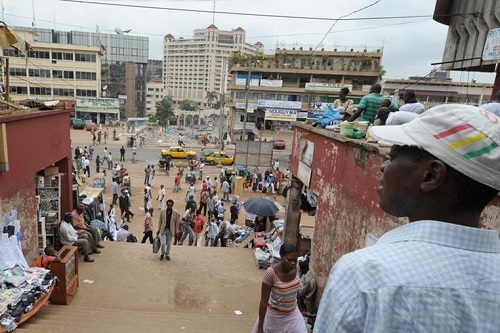AFP photo
By
Joseph Besong
Since the last academic year, Cameroon, especially the section that was originally annexed by Britain, has been in turmoil. Children have been out of school due to an ongoing struggle by Anglophones who believe they are being marginalized by their French counterparts, a strike action that was started by lawyers over the issue of English as applicable in both courts in the NW and SW regions. It soon switched from the lawyers to the teachers trade unions of Cameroon, the unions joining the lawyers’ strike and demanding a total overhaul of the educational system in Cameroon, especially those in the English speaking Cameroons. Among the demands was the recruitment of English language Cameroonians to teach the subject in schools. The English language contentment was so huge that it soon trended politically. The strike organizers, motivated by the issue of English, blasted the government for relegating the language to the background. Any objective person would agree that Anglophones were genuine in voicing their grievances as they are increasingly clear and visible.
Let me begin in the areas where all Anglophones are on the same page. They share the same feeling that the English speaking men and women of Cameroon are treated unfairly. Critics assume a minority status is responsible but again point to the fact that Canada, with the same system, doesn’t discriminate against their minorities. They believe Cameroon should treat citizens and their cultures fairly, with the English language to be emphasized. All Anglophones do share the same feelings of being left out when it comes to enjoying the national cake. They long for a day when this will come to an end, but at the same time Anglophones across the board differ in opinion on the ways to get there as described below.
Pressure Groups In Anglophone Cameroons
Groups like Ambazonia want independence for Anglophones. This group doesn’t want any dialogue with the government. They are pressing for independence of Southern Cameroons. They are both at home and abroad, call themselves Ambazonians and used Facebook and WhatsApp to sabotage the government of Cameroon. Information gets to them so easily. One is taken aback how this information gets to them. They are of the opinion that the government should release all of those in prison before any dialogue or school resumption. No one can argue or minimize the power of social media not just in Cameroon but the world over. Due to their activities online, the government is forced to send emissaries abroad, notably Europe and America, to tell their part of the story.
Anglophone For Federation
It should be noted that prior to 1972, Cameroon was made up of two federated states, West Cameroons and East Cameroon, with West Cameroons having autonomy. Other Anglophones want dialogue towards federated states. These people believe federal government will guarantee a stronger Anglophone and a better Cameroon. They equally feel that stopping kids from going to school is a bad decision that will hurt the same struggle in future, especially as schools in French Cameroun are ongoing and effective.
The Church In Angopohone Cameroon
The churches in Anglophone Cameroon play a vital role in the educational and social domain in this part of the country. Unfortunately, the government of Cameroon has never taken the recommendations from the churches seriously so as to ameliorate the sufferings of the common man in this country. When the unrest started, the church leaders, notably the Catholic, Presbyterian and Baptist, pleaded with the government to solve the Anglophone problem but little was done. Mission schools control by the churches closed due to the unrest and there is no hope of getting things rolling back. Although the various churches have called for the resumption of schools for the 2017/2018 academic year, uncertainty looms. The church wants dialogue and as their mission is to be neutral in politics, they are trying to strike a balance. Recently the Catholic, Baptist and Presbyterian church were asked to answer questions pertaining to accusations that they masterminded the strike in one or the other in the court of law. Until this day, the case against them has been postponed to an unknown date.
Cameroon is among those countries that have enjoyed peace until last year when instability set in with the lawyers’ strike, followed by the teachers. Life has been unbearable for the Anglophones as a result of the unrest. If the government wants to solve the problem, they have to release all of those jailed as a result of the struggle and then call for genuine dialogue. The present situation is not good for the government especially as there are plans for the presidential elections in 2018.
Joseph Besong
I am the editor-in-chief of Kilimandjaro radio. I hail from Africa, precisely from Cameroon in Central Africa.
I did my secondary education at Bishop Rogan College Soppo-Buea located in the South West Region of Cameroon. After graduation, I proceeded to the University of Buea-Cameroon where I read English minor in Journalism and Mass Communication. I later worked in Cameroon as a broadcaster with Two radios namely Radio Evangelum and CBS Radio all located in Buea.
Presently, I work with Kilimandjaro radio, an online radio station based in Canada.



No Comments Yet!
You can be first to comment this post!